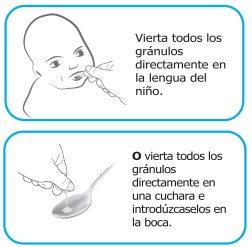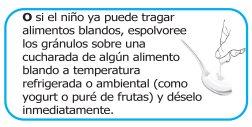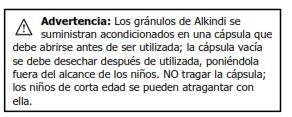
ALKINDI 0.5 mg GRANULES IN CAPSULES TO OPEN
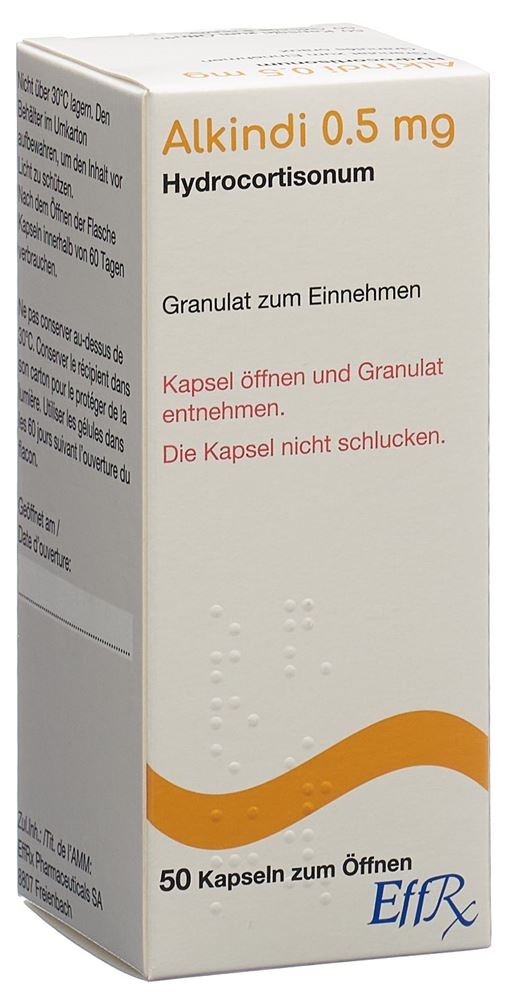

How to use ALKINDI 0.5 mg GRANULES IN CAPSULES TO OPEN
Translated with AI
This page provides general information and does not replace a doctor’s consultation. Always consult a doctor before taking any medication. Seek urgent medical care if symptoms are severe.
Show originalContents of the leaflet
Introduction
Package Leaflet: Information for the User
Alkindi 0.5mg granules in opening capsules
Alkindi 1mg granules in opening capsules
Alkindi 2mg granules in opening capsules
Alkindi 5mg granules in opening capsules
Hydrocortisone

Read the entire package leaflet carefully before starting to administer this medication, as it contains important information for you.
- Keep this package leaflet, as you may need to read it again.
- If you have any questions, ask your doctor or pharmacist.
- This medication has been prescribed only for your child and should not be given to others. It could harm them, even if they have the same symptoms as the child for whom this medication was prescribed.
- If your child experiences any side effects, consult your doctor or pharmacist, even if they are not listed in this package leaflet. See section 4.
Contents of the Package Leaflet
- What is Alkindi and what is it used for
- What you need to know before starting to use Alkindi
- How to administer Alkindi
- Possible side effects
- Storage of Alkindi
- Package contents and additional information
1. What is Alkindi and what is it used for
Alkindi contains a medication called hydrocortisone. Hydrocortisone belongs to a group of medications called corticosteroids.
Hydrocortisone is a synthetic version of the hormone cortisol. Cortisol is naturally produced in the body by the adrenal glands. Alkindi is used when the body does not produce enough cortisol due to a non-functioning part of the adrenal gland (adrenal insufficiency, which is often due to a hereditary disorder called congenital adrenal hyperplasia).
2. What you need to know before starting to use Alkindi
Do not administer Alkindi:
- If your child is allergic to hydrocortisone or any of the other components of this medication (listed in section 6).
- If your child has difficulty swallowing food or is a premature baby who is not yet fed by mouth.
Warnings and precautions
Consult your doctor or pharmacist before using Alkindi if your child:
- is ill or has an infection. The endocrinologist may temporarily increase the dose of Alkindi; consult the endocrinologist if your child becomes ill. If your child vomits or has an acute condition, they may need an injection of hydrocortisone. The endocrinologist will teach you how to administer it in case of an emergency.
- needs to be vaccinated. The administration of Alkindi does not prevent your child from being vaccinated. Inform your endocrinologist about your child's vaccination schedule.
- needs to undergo surgery. Inform the anesthesiologist that your child is taking Alkindi before the procedure.
- is fed through a nasogastric tube. The Alkindi granules are not suitable for administration through a nasogastric tube, as the granules may clog the tube.
Do not stop administering Alkindi without the advice of your endocrinologist, as your child may become very ill quickly.
As Alkindi replaces the hormone that your child lacks, side effects are rare, although:
- An excess of Alkindi may affect your child's growth, so your endocrinologist will adjust the dose based on your child's size and carefully monitor their growth. Talk to your endocrinologist if you are concerned about your child's growth rate (see section 4).
- An excess of Alkindi may affect your child's bones, so your endocrinologist will adjust the dose based on your child's size.
- Some adults taking hydrocortisone (similar to Alkindi) experience anxiety, depression, or confusion. It is not known if this can happen to children, but if your child shows abnormal behavior after starting to receive Alkindi, you should discuss it with your endocrinologist (see section 4).
- Allergy to hydrocortisone has been observed in patients allergic to other medications. Inform your endocrinologist immediately if your child experiences any reaction such as inflammation or difficulty breathing after receiving Alkindi (see section 4).
- Contact your endocrinologist if your child experiences blurred vision or other visual disturbances.
Sometimes, Alkindi granules may appear in your child's diaper or stool after taking Alkindi. This is because the core of the granules is not absorbed in the intestine once the medication has been released. This does not mean that the medication has not taken effect, so do not give your child another dose.
Other medications and Alkindi
Tell your doctor or pharmacist if your child is taking, has recently taken, or may take any other medication, including those that can be obtained without a prescription.
Some medications affect the functioning of Alkindi, which may mean that your endocrinologist needs to modify the dose of Alkindi that your child receives.
Among the medications that may require your endocrinologist to increase the dose of Alkindi that your child receives are:
- Medications used to treat epilepsy: phenytoin, carbamazepine, and oxcarbazepine.
- Medications used to treat infections (antibiotics): rifampicin and rifabutin.
- Medications called barbiturates, which can be used to treat seizures (such as phenobarbital and primidone).
- Medications used to treat HIV: efavirenz and nevirapine.
Among the medications that may require your endocrinologist to decrease the dose of Alkindi that your child receives are:
- Medications used to treat fungal infections: itraconazole, posaconazole, and voriconazole.
- Medications used to treat infections (antibiotics): erythromycin and clarithromycin.
- Medication used to treat HIV infection and AIDS: ritonavir.
Taking Alkindi with food and drinks
Some foods and drinks affect the functioning of Alkindi, which may mean that your endocrinologist needs to reduce the dose of Alkindi that your child receives. These include:
- Grapefruit juice.
- Licorice.
Pregnancy, breastfeeding, and fertility
Hydrocortisone can be used during pregnancy and breastfeeding if the body does not produce enough cortisol.
There are no data on the possible effects of Alkindi on fertility.
Driving and using machines
Alkindi does not affect your child's ability to perform tasks that require skill (such as riding a bicycle) or to use machines.
3. How to administer Alkindi
Follow the administration instructions for this medication exactly as indicated by your endocrinologist, nurse, or pharmacist. If you are unsure, ask your endocrinologist, nurse, or pharmacist.
Your endocrinologist will decide the appropriate dose of Alkindi based on your child's weight or size (body surface area) and will adjust the dose of Alkindi as your child grows. During illnesses, before surgeries, and in situations of intense stress, your endocrinologist may recommend increasing the dose of Alkindi and may also recommend that your child receive other forms of hydrocortisone instead of or in addition to Alkindi.
How to administer this medication
The granules should be placed in the mouth and not chewed. The capsule shell should not be swallowed, but rather carefully opened as follows:
How to open Alkindi capsules and administer the granules |
|
|
|
|
|
|
| ||
| Regardless of the method used, tap the capsule gently to ensure all the granules are released. If you administer the granules directly into the mouth, give your child something to drink (such as water, breast milk, or infant formula) immediately after, to ensure they swallow all the granules. If you sprinkle the granules over a spoonful of soft food, give it to your child immediately (within 5 minutes) and do not save it for future use DO NOTadd the granules to a liquid before administration, as this may result in a lower dose being administered and may also dissolve the flavor mask of the granules, making the bitter taste of hydrocortisone more noticeable. | |
|
|
If you administer more Alkindi than you should
If you have given your child more Alkindi than they should take, contact your endocrinologist or pharmacist as soon as possible for advice on what to do.
If you forget to administer Alkindi
If you forget to administer a dose to your child, give them the dose as soon as you remember and the next dose at the usual time, even if this means your child receives two doses at the same time.
If you stop treatment with Alkindi
Do not stop administering Alkindi to your child without consulting your endocrinologist first. Stopping the medication abruptly can make your child very ill quickly.
If your child becomes ill
Consult your endocrinologist or pharmacist if your child becomes ill, experiences intense stress, is injured, or is going to have surgery, as your endocrinologist may need to increase the dose of Alkindi in these circumstances (see section 2).
If you have any other questions about the use of this medication, ask your doctor or pharmacist.
4. Possible side effects
Like all medications, this medication can cause side effects, although not everyone gets them.
- If your child experiences any reaction such as inflammation or difficulty breathing after receiving Alkindi, go to a doctor immediately and inform your endocrinologist as soon as possible, as it could be an allergic reaction (see section 2).
No side effects have been observed with Alkindi, although the following side effects have been described with other hydrocortisone medications used to replace cortisol:
Frequency not known (cannot be estimated from available data):
- Changes in behavior, such as:
- loss of contact with reality (psychosis) with sensations that are not real (hallucinations) and mental confusion (confusional syndrome).
- excessive excitement and activity (mania).
- intense feeling of happiness and excitement (euphoria).
If your child experiences a drastic change in behavior, consult your endocrinologist (see section 2).
- Stomach pain (gastritis) or nausea.
Contact your endocrinologist if your child reports any of these symptoms.
- Changes in potassium levels in the blood, which can cause an excess of alkalinity in the body's tissues or fluids (hypokalemic alkalosis).
Your endocrinologist will monitor your child's potassium levels to check for changes.
Long-term treatment with hydrocortisone may be associated with changes in bone development and a reduction in growth. Your endocrinologist will monitor your child's growth and bone health (see section 2).
Reporting side effects
If your child experiences any side effects, consult your doctor or pharmacist, even if they are not listed in this package leaflet. You can also report them directly through the national reporting system included in Appendix V. By reporting side effects, you can help provide more information on the safety of this medication.
5. Storage of Alkindi
Keep this medication out of sight and reach of children.
Do not use this medication after the expiration date stated on the bottle and carton after EXP. The expiration date is the last day of the month indicated.
Do not store above 30°C. Store in the original bottle to protect from light.
Once the bottle is opened, use the capsules within 60 days.
Medications should not be disposed of through wastewater or household waste. Ask your pharmacist how to dispose of the packaging and any unused medication. This will help protect the environment.
6. Package contents and additional information
Composition of Alkindi
- The active ingredient is hydrocortisone.
- Alkindi 0.5 mg granules in opening capsules: each capsule contains 0.5 mg of hydrocortisone
- Alkindi 1 mg granules in opening capsules: each capsule contains 1 mg of hydrocortisone
- Alkindi 2 mg granules in opening capsules: each capsule contains 2 mg of hydrocortisone
- Alkindi 5 mg granules in opening capsules: each capsule contains 5 mg of hydrocortisone
- The other ingredients are microcrystalline cellulose, hypromellose, magnesium stearate, and ethylcellulose.
- The capsule is made of hypromellose.
- The printing ink used on the capsules contains shellac, propylene glycol, and concentrated liquid ammonia. The ink used on the 0.5 mg capsule also contains potassium hydroxide and red iron oxide (E172). The ink used on the 1 mg capsule also contains indigo carmine (E132). The ink used on the 2 mg capsule also contains indigo carmine (E132), yellow iron oxide (E172), and titanium dioxide (E171). The ink used on the 5 mg capsule also contains potassium hydroxide, titanium dioxide (E171), and red iron oxide (E172).
Appearance of Alkindi and package contents
White to off-white granules contained in a hard, transparent, and colorless opening capsule; the concentration is inscribed on the capsule.
- Alkindi 0.5 mg granules in opening capsules: the capsules are engraved with the inscription "INF-0.5" in red ink.
- Alkindi 1 mg granules in opening capsules: the capsules are engraved with the inscription "INF-1.0" in blue ink.
- Alkindi 2 mg granules in opening capsules: the capsules are engraved with the inscription "INF-2.0" in green ink.
- Alkindi 5 mg granules in opening capsules: the capsules are engraved with the inscription "INF-5.0" in gray ink.
Alkindi is available in high-density polyethylene bottles containing 50 capsules. Each carton contains 1 bottle.
Marketing authorization holder
Diurnal Europe B.V.
Van Heuven Goedhartlaan 935 A
1181LD Amstelveen
Netherlands
Tel.: +31 (0)20 6615 072
Manufacturer
Delpharm Lille SAS
Parc d'Activités Roubaix-Est
22 rue de Toufflers CS 50070
Lys Lez Lannoy, 59 452
France
Date of last revision of this package leaflet:
Other sources of information
Detailed information on this medication is available on the European Medicines Agency website: http://www.ema.europa.eu.
- Country of registration
- Active substance
- Prescription requiredYes
- Manufacturer
- This information is for reference only and does not constitute medical advice. Always consult a doctor before taking any medication. Oladoctor is not responsible for medical decisions based on this content.
- Alternatives to ALKINDI 0.5 mg GRANULES IN CAPSULES TO OPENDosage form: INJECTABLE, 373 mgActive substance: hydrocortisoneManufacturer: Cheplapharm Arzneimittel GmbhPrescription requiredDosage form: INJECTABLE, 75 mgActive substance: hydrocortisoneManufacturer: Cheplapharm Arzneimittel GmbhPrescription requiredDosage form: CAPSULE, 1 mgActive substance: hydrocortisoneManufacturer: Diurnal Europe B.V.Prescription required
Online doctors for ALKINDI 0.5 mg GRANULES IN CAPSULES TO OPEN
Discuss questions about ALKINDI 0.5 mg GRANULES IN CAPSULES TO OPEN, including use, safety considerations and prescription review, subject to medical assessment and local regulations.
Frequently Asked Questions




 Hold the capsule so that the text is at the top and tap it gently to ensure the granules are at the bottom
Hold the capsule so that the text is at the top and tap it gently to ensure the granules are at the bottom Gently press the lower part of the capsule.
Gently press the lower part of the capsule. Twist and separate the top part of the capsule
Twist and separate the top part of the capsule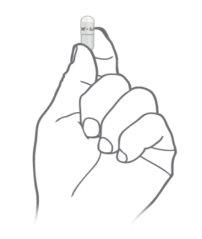
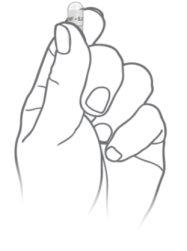
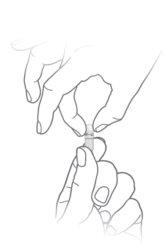
 Pour all the granules out of the capsule
Pour all the granules out of the capsule